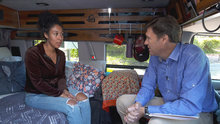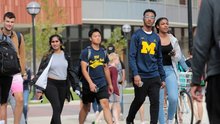0
Report
Community: Postsecondary
May 2, 2019
Innovative public housing authorities (PHAs) are collaborating with college access partners and community colleges to increase postsecondary educational achievement for low-income residents and college students experiencing homelessness. This report elevates 11 shared learnings from a recent convening of these five pioneering PHAs and their postsecondary collaborators, and offers a series of recommendations to policy makers, PHAs, and philanthropic organizations seeking to develop emerging cross-sector collaborations between housing and education organizations. The report also includes an overview of the federal policies that support and limit postsecondary achievement for students served by PHAs, and profiles of the five partnerships: CHA and partners City Colleges of Chicago and One Million Degrees; CMHA and partner Columbus State Community College; HACLA and partner Southern California College Access Network (SoCal CAN); LMHA and partner Family Scholar House; and THA and partner Tacoma Community College.
Authored by: Abra Lyons-Warren for CLPHA
Topics: CLPHA, Education, Housing, Legislation & Policy, Low-income, Partnerships, Post-secondary, Stability
 Shared by Abra Lyons-Warren
Shared by Abra Lyons-Warren
Abra Lyons-Warren posted a
on Oct 6, 2020
Abra Lyons-Warren for CLPHA
Innovative public housing authorities (PHAs) are collaborating with college access partners and community colleges to increase postsecondary educational achievement for low-income residents and college students experiencing homelessness.
0
Webinar
Community:
Feb 12, 2020
A discussion with attorney Alex Elson from the National Student Legal Defense Network and director of FAIL STATE, Alex Shebanow, to talk about predatory for-profit institutions and how that affects low income residents.
About the film:
Over five years in the making, FAIL STATE investigates the for-profit college industry and the decades-long reports of student loan abuse within the sector. The film’s central thesis: aided by a cabal of politicians, nationwide disinvestment in public colleges and universities, and an unscrupulous desire to maximize profits at all costs, for-profit colleges have exploited millions of low-income and minority students, leaving them with worthless degrees and drowning in student loan debt. With echoes of the subprime mortgage crisis, director Alexander Shebanow traces the rise of the for-profit college industry in American higher education and uncovers a story that the Los Angeles Times calls “truly eye-opening and crucial.” The film premiered to sold-out shows at DOC NYC, SXSW EDU, Cleveland International, and debuted on STARZ in December 2018. Director Alexander Shebanow and Executive Producer Dan Rather were awarded the 2019 William Randolph Hearst Award for Outstanding Professional Media Service for their work on FAIL STATE.
Authored by: CLPHA
Topics: Advocacy, CLPHA, Education, Housing Is Working Group, Legislation & Policy, Low-income, Post-secondary
 Shared by Abra Lyons-Warren
Shared by Abra Lyons-Warren
Abra Lyons-Warren posted a
on Feb 12, 2020
A discussion with attorney Alex Elson from the National Student Legal Defense Network and director of FAIL STATE, Alex Shebanow, to talk about predatory for-profit institutions and how that affects low income residents.
About the film:
Over five years in the making, FAIL STATE investigates the fo
0
Report
Community:
Apr 1, 2019
College Promise programs aim to make students believe they can afford college, and to give them the opportunity to go to college and earn degrees without taking on significant debt. At the core of all College Promise programs is a scholarship: All eligible College Promise students receive scholarships that may cover up to 100 percent of tuition and fees at postsecondary institutions. Additionally, many Promise programs are designing, implementing, and refining additions to their models by providing students with support services once they enroll in college. MDRC’s College Promise Success Initiative (CPSI) provides important lessons for Promise programs interested in including such services.This brief shares early lessons from CPSI about how different Promise programs are designing, implementing, and refining their models with embedded student services in mind.
Authored by: Jacklyn Willard, Andrea Vasquez, and Marco Lepe for MDRC
Topics: Education, Low-income, Post-secondary, Research, Youth
 Shared by Housing Is
Shared by Housing Is
Housing Is posted a
on Apr 24, 2019
Jacklyn Willard, Andrea Vasquez, and Marco Lepe for MDRC
College Promise programs aim to make students believe they can afford college, and to give them the opportunity to go to college and earn degrees without taking on significant debt.
0
Report
Community:
Apr 20, 2019
Detroit’s Promise program was designed to encourage college attendance among some of the nation’s most underserved students, those in Detroit, Michigan. The next step was to help students succeed once they enrolled in college. To do so, MDRC and the Detroit Promise partnered to create the Detroit Promise Path, an evidence-based student services program. Detroit Promise Path students begin meeting with college coaches in the late summer before their first semester of college. They are given an incentive to attend coaching meetings in the form of a monthly gift card refilled with $50 each month that they meet with coaches as directed. The program lasts all year, including summer semesters, when students are encouraged to enroll in summer classes or engage in a local summer jobs program. The entire operation is supported by a management information system.
Authored by: MDRC
Topics: Education, Low-income, Midwest, Post-secondary, Research
 Shared by Housing Is
Shared by Housing Is
Housing Is posted a
on Apr 24, 2019
Detroit’s Promise program was designed to encourage college attendance among some of the nation’s most underserved students, those in Detroit, Michigan. The next step was to help students succeed once they enrolled in college.
0
Publication
Community:
Founded in 1995 as Project Women, Family Scholar House (FSH) provides comprehensive, holistic services for disadvantaged single parents, their children, and foster alumni. The nonprofit seeks to end the cycle of poverty and transform communities by empowering families and youth to succeed in education and life-long self-sufficiency. FSH provides supportive housing, educational programming, and participant advocacy to help families gain independence.
Authored by: American Planning Association
Topics: Dual-generation, Early childhood, Education, Homelessness, Housing, Low-income, Partnerships, Place-based, Post-secondary, South, Stability
 Shared by Mica O'Brien
Shared by Mica O'Brien
Mica O'Brien posted a
on Apr 18, 2019
American Planning Association
Founded in 1995 as Project Women, Family Scholar House (FSH) provides comprehensive, holistic services for disadvantaged single parents, their children, and foster alumni.
0
News Article
Community:
Jan 20, 2019
Unlike elementary and secondary school students, whose families can get some support from things like federal free breakfast and lunch programs, for college students much of that assistance dries up.
Authored by: Deirdre Cohen for CBS News
Topics: Education, Food insecurity, Homelessness, Housing, Low-income, Post-secondary, Youth
 Shared by Housing Is
Shared by Housing Is
Housing Is posted a
on Jan 28, 2019
Deirdre Cohen for CBS News
Unlike elementary and secondary school students, whose families can get some support from things like federal free breakfast and lunch programs, for college students much of that assistance dries up.
0
Interactive
Community:
Sep 20, 2018
This SchoolHouse Connection series is focused on helping youth experiencing homelessness succeed in college. We highlight best practices for supporting these students from institutions across the country. These are living documents that will be updated regularly to provide new and innovative practices.
Authored by: SchoolHouse Connection
Topics: Dual-generation, Education, Homelessness, Housing, Low-income, Post-secondary, Youth
 Shared by Mica O'Brien
Shared by Mica O'Brien
Mica O'Brien posted a
on Jan 16, 2019
This SchoolHouse Connection series is focused on helping youth experiencing homelessness succeed in college. We highlight best practices for supporting these students from institutions across the country.
0
Report
Community:
Jan 10, 2019
There isn't federal data on food insecurity among college students nationally, so the GAO reviewed 31 studies on the topic, showing that most concluded that over a third of college students don't always have enough to eat.
Authored by: Elissa Nadworny and Clare Lombardo for NPR
Topics: Education, Food insecurity, Health, Legislation & Policy, Low-income, Nutrition, Post-secondary, Research, Youth
 Shared by Housing Is
Shared by Housing Is
Housing Is posted a
on Jan 16, 2019
Elissa Nadworny and Clare Lombardo for NPR
There isn't federal data on food insecurity among college students nationally, so the GAO reviewed 31 studies on the topic, showing that most concluded that over a third of college students don't always have enough to eat.
0
Publication
Community:
Dec 1, 2018
A guide for youths who are or were homeless, or are at risk of experiencing homelessness
Authored by: U.S. Department of Education
Topics: Education, Homelessness, Housing, Low-income, Post-secondary
 Shared by Mica O'Brien
Shared by Mica O'Brien
Mica O'Brien posted a
on Jan 8, 2019
U.S. Department of Education
A guide for youths who are or were homeless, or are at risk of experiencing homelessness
0
Webinar
Community:
Dec 11, 2018
CLPHA’s Education Working Group hosts a webinar including presentations on efforts from the Chicago Housing Authority to work with residents on pursuing postsecondary opportunities, as well as an update from HUD’s Office of Policy Development & Research on data collection around tracking and increasing FAFSA utilization.
Authored by: CLPHA
Topics: CLPHA, Cost effectiveness, Data sharing, Education, Funding, Housing, Housing Is Working Group, Low-income, Metrics, Midwest, Post-secondary, Research, Stability, Youth
 Shared by Mica O'Brien
Shared by Mica O'Brien
Mica O'Brien posted a
on Dec 12, 2018
CLPHA’s Education Working Group hosts a webinar including presentations on efforts from the Chicago Housing Authority to work with residents on pursuing postsecondary opportunities, as well as an update from HUD’s Office of Policy Development & Research on data collection around tracking and inc
0
Research
Community:
Dec 1, 2018
ASAP is a comprehensive program that provides students with up to three years of financial and academic support and other support services to address multiple barriers to student success, with the goal of helping more students graduate within three years. MDRC’s random assignment evaluation of CUNY ASAP found that after three years, 40 percent of ASAP students graduated compared with just 22 percent of control group students. After six years, ASAP students continued to outperform the control group, with 51 percent of the program group earning degrees compared with 41 percent of the control group.
Authored by: MDRC
Topics: Education, Low-income, Midwest, Post-secondary, Research, Youth
 Shared by Mica O'Brien
Shared by Mica O'Brien
Mica O'Brien posted a
on Dec 12, 2018
ASAP is a comprehensive program that provides students with up to three years of financial and academic support and other support services to address multiple barriers to student success, with the goal of helping more students graduate within three years.
0
Case study
Community:
Dec 1, 2018
In 2014, as part of the Accelerated Study in Associate Programs (ASAP) Ohio Demonstration, Lorain County Community College launched Students Accelerating in Learning (SAIL), a comprehensive student success program that is substantially improving persistence and graduation rates among low-income students. Given the program’s results, Lorain has committed to sustaining the program and expanding it to serve most of its low-income student population. If the college achieves this goal, it could close attainment gaps between low-income and more affluent students, markedly boost its overall graduation rate, gain revenue through increased tuition and performance-based funding, and, most important, significantly enhance the educational and career trajectories of its students. During early implementation, the college took several steps to fund and institutionalize SAIL that are
now making it easier to sustain the program. This brief draws lessons from Lorain’s experience to shed light on how other postsecondary institutions may adopt and sustain similar programs to increase student success.
Authored by: Camielle Headlam for MRDC
Topics: Education, Low-income, Post-secondary, Research
 Shared by Mica O'Brien
Shared by Mica O'Brien
Mica O'Brien posted a
on Dec 12, 2018
Camielle Headlam for MRDC
In 2014, as part of the Accelerated Study in Associate Programs (ASAP) Ohio Demonstration, Lorain County Community College launched Students Accelerating in Learning (SAIL), a comprehensive student success program that is substantially improving persistence and graduation rates among low-income stud
0
News Article
Community:
Dec 11, 2018
A mailer sent to low-income students with that promise led to a major jump in enrollment at the University of Michigan, according to a new study.
Authored by: Adam Harris for The Atlantic
Topics: Education, Funding, Low-income, Post-secondary, Research, Youth
 Shared by Housing Is
Shared by Housing Is
Housing Is posted a
on Dec 11, 2018
Adam Harris for The Atlantic
A mailer sent to low-income students with that promise led to a major jump in enrollment at the University of Michigan, according to a new study.
0
Report
Community:
Oct 18, 2018
A program called Find the Fit, which combines personalized planning materials and text messaging for students, and training webinars for advisors, increased the number and selectivity of colleges to which students apply. This report, the first from a six-year study, determined that Find the Fit led to some changes in the advising within Upward Bound and in students’ actions related to enrolling in a more selective college.
Authored by: Alina Martinez, Tamara Linkow, Hannah Miller, and Amanda Parsad for Mathematica
Topics: Education, Low-income, Post-secondary, Research, Youth
 Shared by Mica O'Brien
Shared by Mica O'Brien
Mica O'Brien posted a
on Nov 16, 2018
Alina Martinez, Tamara Linkow, Hannah Miller, and Amanda Parsad for Mathematica
A program called Find the Fit, which combines personalized planning materials and text messaging for students, and training webinars for advisors, increased the number and selectivity of colleges to which students apply.
0
Policy Brief
Community:
Nov 1, 2018
Colleges and higher education systems can make institutional policy changes to bolster the success of students who are parents and their families through intentional use of a two-generation approach. This brief focuses on traditional two-year and four-year baccalaureate pathways for students who are parents; it complements a brief released on policy solutions.
Authored by: Ascend: The Aspen Institute
Topics: Dual-generation, Education, Low-income, Partnerships, Post-secondary, Youth
 Shared by Mica O'Brien
Shared by Mica O'Brien
Mica O'Brien posted a
on Nov 1, 2018
Ascend: The Aspen Institute
Colleges and higher education systems can make institutional policy changes to bolster the success of students who are parents and their families through intentional use of a two-generation approach.
0
News Article
Community:
Nov 1, 2018
Many youth experiencing homelessness report avoiding shelters because they don’t feel safe there or can’t relate to the older adults, but they often don’t have another option. It’s a problem that many jurisdictions are working to correct, understanding that although homeless youth and homeless adults have similar needs, reaching these young people may require different spaces and different strategies.
Authored by: Serena Lei for How Housing Matters
Topics: East Coast, Education, Homelessness, Housing, Low-income, Metrics, Post-secondary, Safety, Youth
 Shared by Mica O'Brien
Shared by Mica O'Brien
Mica O'Brien posted a
on Nov 1, 2018
Serena Lei for How Housing Matters
Many youth experiencing homelessness report avoiding shelters because they don’t feel safe there or can’t relate to the older adults, but they often don’t have another option.
0
Report
Community:
Oct 24, 2018
CLPHA’s Housing Is Initiative is engaged in a number of cross-sector activities focused on developing partnerships, facilitating a community of practice, resource development, promoting best practices, online collaboration, policy and advocacy, and training and education. Read about recent activities in this Fall Update.
Authored by:
Topics: Child welfare, CLPHA, Community development, Cost effectiveness, Data sharing, Early childhood, Education, Family engagement, Funding, Health, Homelessness, Housing, Low-income, Medicaid / Medicare, Mental health, Partnerships, Place-based, Post-secondary, Research, Stability, Substance abuse, Workforce development, Youth
 Shared by Mica O'Brien
Shared by Mica O'Brien
Mica O'Brien posted a
on Oct 24, 2018
CLPHA’s Housing Is Initiative is engaged in a number of cross-sector activities focused on developing partnerships, facilitating a community of practice, resource development, promoting best practices, online collaboration, policy and advocacy, and training and education.
0
News Article
Community:
Oct 16, 2018
Some community colleges have found innovative partnerships with their public housing authorities may help combat student homelessness.
Authored by: Ashley A. Smith for Inside Higher Ed
Topics: Asset building, CLPHA, Education, Homelessness, Housing, Low-income, Midwest, Pacific Northwest, Partnerships, Post-secondary, Stability, Workforce development
 Shared by Mica O'Brien
Shared by Mica O'Brien
Mica O'Brien posted a
on Oct 24, 2018
Ashley A. Smith for Inside Higher Ed
Some community colleges have found innovative partnerships with their public housing authorities may help combat student homelessness.
0
Policy Brief
Community:
This short document provides basic information to help housing and homeless assistance providers advocate with their families and youth for appropriate educational services, from birth through higher education. The rights and protections outlined here apply to all children and youth experiencing homelessness, as defined by the education subtitle of the McKinney-Vento Act.
Authored by: SchoolHouse Connection
Topics: Disabilities, Dual-generation, Early childhood, Education, Family engagement, Homelessness, Housing, Legislation & Policy, Low-income, Post-secondary, Youth
 Shared by Mica O'Brien
Shared by Mica O'Brien
Mica O'Brien posted a
on Oct 10, 2018
This short document provides basic information to help housing and homeless assistance providers advocate with their families and youth for appropriate educational services, from birth through higher education.
0
News Article
Community: Postsecondary
Oct 2, 2018
An organization is using the influence that teenagers have on their contemporaries to help more students from low-income families gain college admission and student aid.
Authored by: David Bornstein for The New York Times
Topics: Education, Low-income, Mental health, Post-secondary, Stability, Youth
 Shared by Mica O'Brien
Shared by Mica O'Brien
Mica O'Brien posted a
on Oct 9, 2018
David Bornstein for The New York Times
An organization is using the influence that teenagers have on their contemporaries to help more students from low-income families gain college admission and student aid.
0
News Article
Community:
Oct 2, 2018
Students have around 60 programs at their disposal, from advanced manufacturing to emergency medical response.
Authored by: Heather Burian for CT
Topics: East Coast, Education, Food insecurity, Health, Low-income, Post-secondary, Youth
 Shared by Mica O'Brien
Shared by Mica O'Brien
Mica O'Brien posted a
on Oct 4, 2018
Students have around 60 programs at their disposal, from advanced manufacturing to emergency medical response.
0
Podcast
Community:
Sep 17, 2018
About MDRC’s “Evidence First” Podcast Series:
Policymakers talk about solutions, but which ones really work? Join Katie Beal, MDRC’s External Affairs Associate, as she talks with experts about the best evidence available on education and social programs that serve low-income people.
Authored by: Katie Beal with MDRC
Topics: Education, Funding, Legislation & Policy, Low-income, Post-secondary, Workforce development, Youth
 Shared by Mica O'Brien
Shared by Mica O'Brien
Mica O'Brien posted a
on Sep 17, 2018
About MDRC’s “Evidence First” Podcast Series:
Policymakers talk about solutions, but which ones really work? Join Katie Beal, MDRC’s External Affairs Associate, as she talks with experts about the best evidence available on education and social programs that serve low-income people.
1
Report
Community:
May 1, 2018
Our initial report—which followed participants around the country over three years—found, among other things, that Year Up increased participants’ average quarterly earnings by more than 50 percent. These are the largest gains in earnings measured to date in random assignment studies of workforce training programs for youth and adults.
Authored by: David Fein and Jill Hamadyk for Abt Associates
Topics: Asset building, Education, Low-income, Mobility, Post-secondary, Research, Workforce development, Youth
 Shared by Housing Is
Shared by Housing Is
Housing Is posted a
on Aug 16, 2018
David Fein and Jill Hamadyk for Abt Associates
Our initial report—which followed participants around the country over three years—found, among other things, that Year Up increased participants’ average quarterly earnings by more than 50 percent.
0
News Article
Community:
Jul 5, 2018
Authored by: Brittany Collins for Purpose Built Communities
Topics: Dual-generation, Education, Family engagement, Low-income, Mobility, Post-secondary, Youth
 Shared by Housing Is
Shared by Housing Is
Housing Is posted a
on Jul 11, 2018
Brittany Collins for Purpose Built Communities
0
News Article
Community:
Feb 15, 2018
Authored by: Jon Marcus and Matt Krupnick for The Hechinger Report (originally featured in The Atlantic)
Topics: Community development, Education, Family engagement, Low-income, Midwest, Post-secondary, Research, Workforce development, Youth
 Shared by Housing Is
Shared by Housing Is
Housing Is posted a
on Jul 5, 2018
Jon Marcus and Matt Krupnick for The Hechinger Report (originally featured in The Atlantic)
 Shared by Abra Lyons-Warren
on Oct 6, 2020
Shared by Abra Lyons-Warren
on Oct 6, 2020
 Shared by Abra Lyons-Warren
on Feb 12, 2020
Shared by Abra Lyons-Warren
on Feb 12, 2020
 Shared by Housing Is
on Apr 24, 2019
Shared by Housing Is
on Apr 24, 2019
 Shared by Housing Is
on Apr 24, 2019
Shared by Housing Is
on Apr 24, 2019



 Shared by Housing Is
on Jan 28, 2019
Shared by Housing Is
on Jan 28, 2019




 Shared by Housing Is
on Jan 16, 2019
Shared by Housing Is
on Jan 16, 2019


 Shared by Housing Is
on Dec 11, 2018
Shared by Housing Is
on Dec 11, 2018








 Shared by Housing Is
on Aug 16, 2018
Shared by Housing Is
on Aug 16, 2018

 Shared by Housing Is
on Jul 11, 2018
Shared by Housing Is
on Jul 11, 2018
 Shared by Housing Is
on Jul 5, 2018
Shared by Housing Is
on Jul 5, 2018




